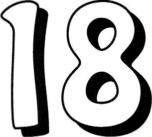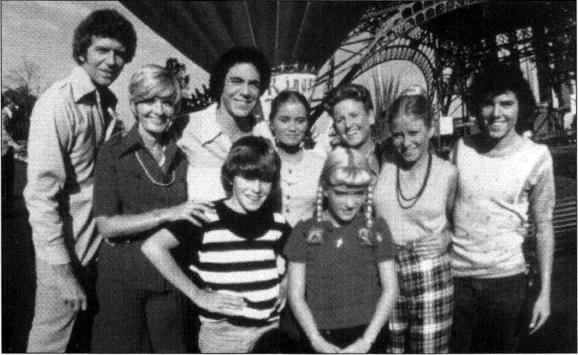Growing Up Brady: I Was a Teenage Greg, Special Collector's Edition (21 page)
Read Growing Up Brady: I Was a Teenage Greg, Special Collector's Edition Online
Authors: Barry Williams;Chris Kreski

I arrived at my dressing room, got into wardrobe, and headed
over to see my pal Tom Miller, the makeup man. I was still feeling
the strong effects of the smoke, but I did feel adequately in control
to get through the scene.
"Hi, Tom. Fix me up, will ya?
"Sure, Barry," he replied. "I'll ... uh ... do my best."
He proceeded to apply the thin layer of base makeup that we Bradys always used to soften the glare of the lights and give us that
"eternally tan" look. Five minutes later, Tom was finished and, with
a crooked smile, said, "Here, Barry, you'll need some of this." At
which point he handed me a bottle of Visine eye drops.
"Oh, yeah," I lamely responded. "That pool chlorine is a killer."
"My God!" I thought. "Does he know? Is it obvious? Can anyone
else tell?"
Just then, Bill the AD appeared and told me that Robert Reed,
Florence Henderson, and Hal Cooper (the episode's director)
were on the set, ready for rehearsal and waiting for me. "Fine," I
told myself. "Be cool."
Having taken a deep breath, and made sure that Tom's Visine
took the red out, my mood began to swing, and I began strutting
toward the set, feeling just great about life. It now was about ninety minutes since my last toke, but the after-effects were still evident. I started thinking to myself that my now-heightened sense of
consciousness and intensity might give me a chance to completely
recreate my role of Greg Brady, top to bottom.
Up till now, I told myself, Greg had been a bit kind of a boredrippy, predictable, and way too goody-goody. This was my
chance to make him come alive, give him depth and dimension.
Onto the set I strolled, slapping high-fives all around, feeling
very cool, and acting ... well, acting pretty weird. Some of the crew
were starting to stare, but I wasn't paying any attention to unsupportive nonfollowers. I was a man on a mission.
Assistant director McGarry loudly yelled for quiet and rehearsal
began. In his typical laid-back way, our director, Hal Cooper, gave
us the bare-bones blocking, and I took this as my cue to begin a
new ultimate creative process. "This is going to be great," I assured
myself. "Now, for the very first time, I can fully explore the vast
potential of a `Brady Bunch' scene."
The scene had me in the Brady driveway pumping some air into
my bicycle tire. In drove Dad with a small sailboat strapped to the
roof of the family station wagon. I walked over and asked him
about the boat, then Mom entered and we traded a few lines.
Cindy came in next, a little too excited, and Dad explained what
was happening.
Okay. Basic, straight forward, cut and dry stuff. However in my
tingly headed condition, I saw it as crying out for innovation and
improvisation.
First, this hit about pumping air into the bicycle tire, boring, too
simple. So in my mind, I made up a history for the bike; why it
needed air, what happened to the tire, where I had been riding it
at the time. When rehearsal began, I proceeded to get involved
with the spokes of the wheel ... forming a relationship with each individual spoke, and trying to come up with a more aerodynamic
design for them. Instead of merely crossing over to the car and
standing there as expected, I invented a new saunter, like that of
an imaginary ship's captain. Instead of going to my mark, I went
directly over to the boat and tried to figure out how to get it down
from the car. This I reasoned, gave me something to do when
Mom entered the scene. So instead of just standing and listening
to them while they were talking, I opened the car door and stood
on its threshold to reach boat height and worked on loosening the
straps. This line of thought spawned some more creativity on my
part and I considered going into a silent little inner monologue
pretending to be Captain Quig, or Captain Bly, or maybe even
Douglas MacArthur ... oops he was an Army General. "This is
good" I'm told myself, "reeeeal good."
Of course I looked like an ass and was largely ignored, until I
went further. When the dialogue began, I didn't just say my lines, I
experimented with my speaking patterns, and inflections, giving
each individual word undue weight and significance:
YOU didn't SAY anything ABOUT getting a boat, Dad.
You DIDN'T say ANYTHING about GETTING a boat, Dad.
YOU didn't SAYANYTHING ABOUT getting a BOAT, DAD!
It was horrible, but as far as I was concerned, I was really cooking.
In subsequent rehearsals, I changed my lines altogether, or simply made up new ones as we went along, and altogether gave up
on hitting my marks. In short, I was a one man freak show.
The crew was no longer staring, but casting their eyes downward. Now, short on time, they made the final set preparations and
Hal Cooper pulled me aside and said, "Pretty unusual work Barry,
but for this one scene, please do me a favor." His grip upon my
shoulder tightened considerably, and he continued, "after I call
action, cross over to the car, hit your mark, stand there, don't
move, and deliver your lines as written ... OKAY?"
Was he nuts?! I couldn't believe what I was hearing. Why was he
trying to suppress my creativity? Screw that, I just wouldn't listen. I
mumbled something to him and took my place beside my bike. It
was time to shoot. I focused on the bicycle spokes and let my imagination go. Once again I was a scientist full of ideas. Just then the
"long-bell" on our sound stage pierced the air, warning everyone
within earshot to be quiet, as a filmed "take" was about to begin.
And then it happened. The camera operator shouted "Rolling!,"
the audio department yelled "Speed!," the camera assistant ran in
front of the camera yelling "Scene 2, take 1," and the stage fell
silent.
I took that moment to look around the assembly of professionals and somehow became very anxious to start the scene. But
then, just as we were about ready to go, something inside me
began changing. Whereas I'd spent the last hour feeling cocky,
self-assured, and full of myself, I now began to feel all alone and
horribly insecure. I started to imagine that the crew was looking at
me strangely, with an almost evil intent, as if there was something
terribly wrong with me.
Was something terribly wrong with me? I wondered, "Is my
brain's perception out of whack? Am I making a fool out of myself?
Are they laughing at me? Do they know I'm high? I am screwing
up," I thought. "Now what?" At that precise moment, Hal Cooper
yelled "Action!"
That was it. Suddenly my ideas disappeared, my imagination
stopped and I noticed cold sweat beginning to break out on my
forehead. Bob Reed started the car, and the scene began ... for
real. Inside my head I was now listening to an unshakable, nonstop, and highly critical inner dialogue. Far from being carefree
and innovative, I was now second- and third-guessing my every
move, my every word, my every action. Nothing felt natural or
right. It was as though I was outside my body, watching myself
from a distance. I didn't know it at the time, but I was about to discover that for me, the most prevalent side-effect of grass was raging paranoia. What a time to find that out!
Now I'm asking myself all kinds of questions: "How long will
this last? Will this mental distortion ever go away? How will I ever
get through this scene?" My answer to that last one was to become
the most conservative actor in the history of the world.
So I threw out all of the creative concepts that I'd been practicing in rehearsal. Faced with the tension of the moment, I delivered
the safest, blandest, least noticeable take I could muster.
The first thing I did as the take began, was to trip on my bicycle
pump while crossing over to the the car. This was not a part of the
innovative approach I had been concentrating on earlier.
Unfortunately, my ability to be spontaneous was nearly nonexistent. So I pretended not to notice my stumble. I didn't want to be
the one responsible for blowing the take, so I continued on like
nothing happened and hoped somebody else would mess up.
Nobody did.
During the scene itself I tried to hide my unnaturalness by slapping on this kind of phony, cover-all smile in an attempt to bluff
my way through. When Cindy came in I forgot to even look at her
and just kept staring at Mike and Carol with this goofy grin.
I was overflowing with self-doubt, and simply did my best to get
it over with and get the hell out of there. Far from being the plea surable, freeing, mind-expanding experience that I'd expected, getting stoned instead left me inhibited, stifled, self-conscious, and
feeling as phony as the turf in the Brady's backyard. Maybe I
should've just smoked that.
I still don't know for sure if anyone actually knew my secret.
Some probably suspected, but I sure never asked. I just felt lucky
to have gotten through it, and thankful that I had no more scenes
that day.

 e Bradys did almost all of our filming within the confines of the Paramount lot; but every once in a while
e Bradys did almost all of our filming within the confines of the Paramount lot; but every once in a while
we did manage to get out of the studio and go on
location. The year 1971 found us at the bottom of the
Grand Canyon, and '72 found us in Hawaii. However, etched even
more vividly into my memory is our fifth season opener, shot on
location in that fabulous exotic wonderland known as Cincinnati.
As weird as this may sound, we Brady kids were very enthused
about our Cincinnati journey. That's because, our entire Ohio
episode was going to be filmed at the (then) brand-new King's
Island amusement park! Visions of unlimited access to the attractions danced in our heads and we became bound and determined
to hit every thrill-ride in the place, time and again, until we were
either satisfied or too busy puking to continue.

The Bunch hits
King's Island. It
would soon hit
back.
(© Paramount
Pictures)
Come travel day, we were flown to Ohio, driven to the park,
and given the full VIP treatment ... at least by local standards.
Y'see, the King's Island park wasn't actually in Cincinnati but off in
a fairly remote suburb. And while everyone did their best to
accommodate us, none of our well-intentioned hosts had any idea
about how a television show was actually shot. Thus, they had no
way to anticipate the tremendous havoc that a full cast, crew, and
on-location production staff could wreak upon their fledgling
resort.
